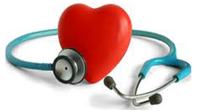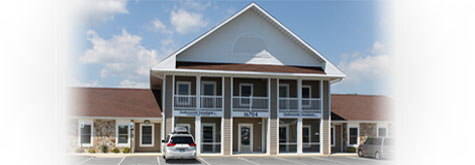Cardiac Rehabilitation
WHAT IS IT?
Cardiac rehabilitation (rehab) is a medically supervised program that helps improve the health and well-being of people who have heart problems. Rehab programs include exercise training, education on heart healthy living, and counseling to reduce stress and help you return to an active life.
Basic Facts
Cardiac rehabilitation (rehab) is a medically supervised program that helps improve the health and well-being of people who have heart problems.
Rehab includes exercise training, education on heart healthy living, and counseling to reduce stress and help you return to an active life.
Cardiac rehab involves a long-term commitment from the patient and a team of health care provides, such as doctors, nurses, exercise specialists, physical and occupational therapists, dietitians or nutritionists, and psychologists or other mental health specialists.
Many people with heart problems can benefit from cardiac rehab. Rehab can help people who have had a heart attack, angioplasty or coronary artery bypass grafting for coronary artery disease, heart valve repair or replacement, a heart transplant or a lung transplant, or stable angina.
The goals of cardiac rehab are to help you recover after a heart attack or heart surgery, address risk factors for heart problems, adopt healthy lifestyle changes, and improve your health and quality of life.
Your rehab team will work with you to meet your goals. You will do this through increased daily physical activity, following a heart healthy eating plan, quitting smoking, and improving your emotional health.
Before starting any cardiac rehab program, your rehab team will assess your health. They will ask about your medical history and do a physical exam. They may order tests to check your overall health.
During cardiac rehab, your team will help create physical activity and heart healthy eating plans. They will work with you to reduce your risk factors for heart problems. If you feel sad, anxious, angry, or isolated, the team can help you get treatment to improve your emotional health.
The lifestyle changes you make during cardiac rehab have few risks. Physical activity may have some risks, but it's very safe in the rehab setting. Very rarely, it may cause serious problems.
Cardiac rehab has many benefits. It can improve your overall health and quality of life and reduce your overall chance of dying, the chance of future heart problems, and the chance of dying from a heart attack. It also can decrease pain and lessen the chance that you will have to go back to the hospital or emergency room for a heart problem.
Who Needs Cardiac Rehabilitation?
Many people with heart problems can benefit from cardiac rehab. Rehab may help people who have had:
- A heart attack
- Angioplasty or coronary artery bypass grafting for coronary artery disease
- Heart valve repair or replacement
- A heart transplant or a lung transplant
- Stable angina
- Heart failure
People of all ages can benefit from cardiac rehab. It's equally helpful to both men and women. Cardiac rehab can improve your overall health and prevent future heart problems and even death.
What Are the Goals of Cardiac Rehabilitation?
The overall goals of cardiac rehab are to help you:
- Recover after a heart attack or heart surgery.
- Address risk factors that lead to coronary artery disease and other heart problems. These risk factors include high blood pressure, high blood cholesterol, overweight or obesity, diabetes, smoking, lack of physical activity, and depression and other emotional health concerns.
Adopt healthy lifestyle changes. - Improve your health and quality of life.
The rehab team will work with you to reach these goals. You will do this through increased daily physical activity, following a heart healthy eating plan, quitting smoking, and improving your emotional health.
Increased Daily Physical Activity
Physical activity lowers your risk for heart problems, such as a heart attack. It helps reduce LDL ("bad") cholesterol and increase HDL ("good") cholesterol. It also helps control your blood pressure and blood sugar level.
Physical activity will help you improve muscle strength, flexibility, and endurance. It can help you lose weight, which can lower your risk for heart disease. Physical activity also helps you cope better with stress, and it may boost your sense of well-being.
Exercise training as part of cardiac rehab may not be safe for all patients. For example, people who have very high blood pressure or severe heart disease may not be ready for exercise training. These patients can still benefit from other parts of the cardiac rehab program.
Following a Heart Healthy Eating Plan
Improving your diet will help you control your cholesterol, blood pressure, and blood sugar. It also may help you lose weight if you're overweight or obese, which is an important step for lowering heart disease risk.
The dietitian on your cardiac rehab team will help you create a personal eating plan.
Quitting Smoking
Quitting smoking will help you control cholesterol and blood pressure and lower your risk for heart problems. It also will make it easier for you to take part in physical activities.
Improving Your Emotional Health
Learning how to manage stress, relax, cope with problems, and build a social support network can improve your emotional as well as your physical health.
Some communities have support groups for people who have had a heart attack or heart surgery. They also may have walking groups or exercise classes.
Physical activity helps some people cope with stress. Other people reduce stress by listening to music or learning to focus on something calm or peaceful. Some people learn yoga, tai chi, or how to meditate.
There are many different types of "relaxation techniques" (ways to relax). By learning to relax and cope with stress, you can reduce your anxiety and lower your blood pressure, heart rate, and cholesterol.
This is true even if you don't reduce other risk factors. Improving your emotional health can decrease your risk of death and future heart problems. It also can increase the chance that you will quit smoking and adopt other healthy behaviors.
Your rehab program also may offer individual or small group counseling to help you.
What To Expect When Starting Cardiac Rehabilitation
Your doctor may refer you to cardiac rehab during an office visit or while you're in the hospital recovering from a heart attack or heart surgery. If your doctor doesn't mention it, ask him or her if cardiac rehab might benefit you.
Rehab activities vary depending on your condition. If you're recovering from major heart surgery, rehab will start with a member of the team helping you to sit up in a chair or take a few steps. You will work on range-of-motion exercises. These include moving your fingers, hands, arms, legs, and feet. Over time you will increase your activity level.
Once you leave the hospital, rehab will continue in a rehab center. The rehab center may be part of the hospital or in another place. Try to find a center close to home that offers services at a convenient time. If no centers are near your home, or if it's too hard to get to them, ask your doctor about home-based rehab.
You will need to go to rehab regularly to learn how to reduce risk factors and to begin an exercise program.
Health Assessment
Before you start your cardiac rehab program, your rehab team will assess your health. This includes taking your medical history, doing a physical exam, and performing tests.
Medical History
A doctor or nurse will ask you about previous heart problems, heart surgery, and any heart-related symptoms you have. He or she also will ask whether you've had medical procedures or other health problems (such as diabetes or kidney disease).
The doctor or nurse will want to know:
- Whether your family has a history of heart disease.
- What medicines you're taking, including over-the-counter and herbal medicines. Describe how much, how often, and when you take each medicine.
Whether you smoke and how much. - How you check your blood sugar level, and how often you do it (if you have diabetes).
- Whether you've ever had hypoglycemia. This condition can occur in people who take medicines to control their blood sugar level.
- Your rehab team will ask questions to help them assess your quality of life and well-being.
Physical Exam
A doctor or nurse will do a physical exam to check your overall health, including your heart rate, blood pressure, reflexes, and breathing.
Tests
Your doctor may order tests to check your heart.
A resting EKG (electrocardiogram) is a simple test that detects and records the electrical activity of your heart. It shows how fast your heart is beating. It also shows the heart's rhythm (steady or irregular) and the strength and timing of electrical signals as they pass through each part of your heart.
You also may need tests to measure your cholesterol and blood sugar levels. If you have diabetes, staff also will do an HbA1C test to check your blood sugar control. This test shows how well your diabetes has been managed over time.
What To Expect During Cardiac Rehabilitation
Cardiac rehab continues on a regular basis for 2 to 3 months. During this time, you learn how to:
- Increase your physical activity and exercise safely
- Follow a heart healthy eating plan
- Reduce risk factors for future heart problems
- Improve your emotional health
The rehab team works with you to create a plan that meets your needs. Each part of cardiac rehab helps lower your risk for future heart problems.
Overall, you usually work with the team for 6 to 12 months. The length of time depends on your situation. The lifestyle changes you make during rehab will become more routine. They will help you maintain a reduced risk for heart disease.
Support from your family can help make cardiac rehab easier. For example, family members can help you plan healthy meals and do physical activities. The healthy lifestyle changes you learn during cardiac rehab can benefit your entire family.
Increase Physical Activity and Exercise Safely
Your cardiac rehab team will assess your physical activity level to learn how active you are at home, at work, and during recreation. If your job includes heavy labor, the team may recreate your workplace conditions to help you practice in a safe setting.
You will work with the team to find ways to safely add physical activity to your daily routine. For example, you may decide to park farther from building entrances, walk up two or more flights of stairs, or walk for 15 minutes during your lunch break.
Your rehab team also will work with you to create an easy-to-follow exercise plan. It will include time for a warmup, flexibility exercises, and cooling down. It also may include aerobic exercise and resistance training.
You will get a written plan that lists each exercise and explains how often and for how long you should do it.
You're more likely to make exercise a habit if you enjoy the activity. Work with the rehab team to find forms of physical activity that you enjoy and that are safe for you. If you prefer to exercise with other people, join a group or ask a friend to join you.
You may only be able to tolerate very light conditioning exercises. The rehab team will help decide what level of exercise is safe for you.
Aerobic Exercise
Typically, your rehab team will ask you to do aerobic exercise 3 to 5 days per week for 30 to 60 minutes. The exercise specialist on your team will make sure that your exercise plan is safe and right for you.
Examples of aerobic exercise are walking (outside or on a treadmill), cycling, rowing, or stair climbing.
Resistance Training
Typically, your rehab team will ask you to do resistance training 2 or 3 days per week. Your exercise plan will show how many times to repeat each exercise.
Resistance training may include lifting weights (hand weights, free weights, or weight machines), using a wall pulley, or using elastic bands to stretch and condition your muscles.
Exercise at the Rehab Center and at Home
At the start of cardiac rehab, you will exercise at the rehab center. Members of your rehab team will carefully watch you to make sure you're exercising safely.
A team member will check your blood pressure several times during exercise training at the rehab center. You also may need an EKG (electrocardiogram) to check your heart's activity during exercise. This test shows how fast your heart is beating and whether its rhythm is steady or irregular.
Your exercise program will change as your health improves. After awhile, you will add at-home exercises to your plan.
Follow a Heart Healthy Eating Plan
Your rehab team will help you create and follow a heart healthy eating plan. This plan will help you reach your rehab goals, which may include managing your weight, blood pressure, diabetes, kidney disease, heart failure, and/or other health problems that your diet can affect.
You will learn how to plan meals that meet your calorie needs and are low in saturated and trans fat, cholesterol, and sodium.
A dietitian or nutritionist may advise you on how to follow a heart healthy eating plan.
Reduce Risk Factors for Future Heart Problems
Your cardiac rehab team will work with you to control your risk factors for heart problems. Risk factors include high blood pressure, high blood cholesterol, overweight or obesity, diabetes, and smoking.
High Blood Pressure
High blood pressure raises your risk for future heart problems. The rehab team will work with you to reach the blood pressure goal your doctor sets. This goal will depend on factors such as your age and whether you have heart failure, diabetes, or kidney disease.
Exercising, losing weight, limiting how much salt and alcohol you consume, and quitting smoking can help you lower your blood pressure.
You may need medicine to lower your blood pressure if lifestyle changes aren't enough.
High Blood Cholesterol
Too much cholesterol in the blood can cause heart disease. Your rehab team will work with you to lower high blood cholesterol.
Following a heart healthy eating plan, losing weight, exercising, quitting smoking, and limiting how much alcohol you drink can help lower cholesterol. Physical activity also can increase HDL cholesterol, which is "good" cholesterol.
You may need medicine to lower your cholesterol if lifestyle changes aren't enough.
Overweight and Obesity
If you're overweight or obese, your rehab team will help you set short- and long-term weight-loss goals. You can reach these goals by following the eating and exercise plans that the team creates for you.
Diabetes
If you have diabetes, your rehab team will work with you to control your blood sugar level. Following a heart healthy eating plan, losing weight, and exercising can lower your blood sugar level.
The doctor may suggest that you test your blood sugar before and after exercising to watch for numbers that are too high or too low. Your doctors will tell you what numbers to look for.
You may need medicine to lower your blood sugar level if lifestyle changes aren't enough.
Smoking
Smoking is a risk factor for heart disease. If you smoke, quitting will help you avoid future heart problems. Quitting can help lower your blood pressure and keep your cholesterol levels healthy. You also should avoid secondhand smoke.
It may help to set a "quit date." Some people find it helpful to enroll in smoking cessation programs or to seek counseling. Other people find acupuncture or hypnosis helpful.
Your doctor also can prescribe medicines to help you to quit smoking.
Improve Emotional Health
Psychological factors increase the risk of getting heart disease or making it worse. Depression, anxiety, and anger are common among people who have heart disease or have had a heart attack or heart surgery.
Get treatment if you feel sad, anxious, angry, or isolated. These bad feelings can affect your physical recovery. Depression is linked to complications such as irregular heartbeats, chest pain, a longer recovery time, the need to return to the hospital, and even an increased risk of death.
The cardiac rehab team needs to know whether you use alcohol or other substances. Alcohol can raise your blood pressure and harm your liver, brain, and heart. Seeking help is important. Group or individual counseling helps lower your risk for future heart attacks and death. It also may motivate you to exercise and help you relax and learn how to reduce stress.
People with heart disease who receive mental health treatment often show improvements in blood pressure, cholesterol, and other measures of physical health.
The rehab team may include a mental health specialist or be able to refer you to one. Without help from a professional, these problems may not go away.
Some communities have support groups for people who have had a heart attack or heart surgery. They also may have walking groups or exercise classes. Help with basic needs and transportation also may be available.3
Counseling for Sexual Dysfunction
People with heart problems sometimes have sexual problems. The most common is less interest or no interest in sex. Impotence or premature or delayed ejaculation may occur in men.
Depression, medicines, fear of causing a heart attack, or diabetes can contribute to sexual problems.
Sexual activity is often safe for low-risk patients. The maximum heart rate during usual sexual activity is similar to other daily activities, such as walking up one or two flights of stairs.
Talk to your doctor if you're having sexual problems and to find out whether sexual activity is safe for you.
What Are the Benefits and Risks of Cardiac Rehab?
Benefits
Cardiac rehab has many benefits. It can:
- Reduce your overall chance of dying, the chance of future heart problems, and the chance of dying from a heart attack
- Decrease pain and the need for medicines to treat heart or chest pain
- Lessen the chance that you will have to go back to the hospital or emergency room for a heart problem
- Improve your overall health by decreasing the risk factors for heart problems
- Improve the quality of your life and make it easier to work, participate in social activities, and exercise
People who attend cardiac rehab on a regular basis also reduce stress, become more independent, and prevent disability.
People who receive help for their emotional health and also start an exercise program can improve their overall health. They can lower their blood pressure and heart rate. They also can lower their LDL ("bad") cholesterol and raise their HDL ("good") cholesterol. These people are less likely to die or have another heart attack.
Treatment for emotional health also can help some people quit smoking.
Risks
The lifestyle changes that you make during cardiac rehab have few risks.
At first, physical activity is safer in the rehab setting than at home. Members of the rehab team are trained and have experience teaching people with heart problems how to exercise.
Your rehab team will watch you to make sure you're safe. They will check your blood pressure several times during your exercise training. They also may use an EKG (electrocardiogram) to see how your heart reacts and adapts to exercise. After some training, most people learn to exercise safely at home.
Very rarely, physical activity during rehab causes serious problems. These problems may include injuries to your muscles and/or bones, or heart rhythm problems that can lead to death or recurrent heart attack.
Your rehab team will tell you about signs and symptoms of possible problems to watch for while exercising at home. If you notice these signs and symptoms, you should stop the activity and contact your doctor.
If you have other questions call our office at 302-644-1233.




